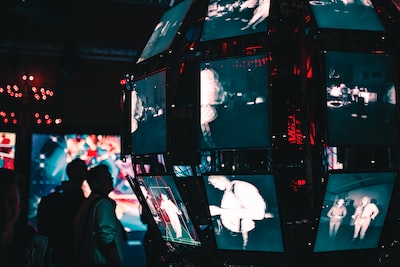In a world where technology permeates every aspect of our lives, it should come as no surprise that the realm of creative arts is not immune to its influence. Enter AI-powered email surveillance, a controversial practice that has recently gained prominence in the theater industry.
Picture this: a theater director sitting at their desk, anxiously typing away an email to a potential collaborator. Little do they know, their every word is being scrutinized by an AI algorithm, deciphering hidden meaning, analyzing emotional undertones, and predicting future artistic ambitions.
Some may argue that this intrusion is essential to ensuring artistic integrity and preventing undisclosed agendas from tainting productions. Others, however, decry it as a violation of privacy, a stifling force that discourages creative expression and fosters a climate of distrust.
As the lines between surveillance and art blur, the theater community finds itself at the center of an ongoing debate over the boundaries of privacy, the role of technology, and the essence of creative freedom. Should theater directors embrace this AI-powered tool, or should they resist its encroachment on their artistic process? The answers are far from clear, but the conversation has only just begun.
Theatre director email surveillance: a controversial innovation that both intrigues and unsettles, leaving us questioning the limits of creativity and the ethical implications of technological intrusion.
In an age of ever-evolving technologies, it seems nothing is beyond the bounds of possibility. From self-driving cars to machine learning algorithms, the boundaries of what we once deemed unimaginable continue to shatter before our eyes.
And now, in a twisted turn of events, we find ourselves facing the emergence of AI-powered email surveillance. That’s right, folks, your inbox may no longer be a private sanctuary.
As if the growing skepticism towards online privacy wasn’t enough, we now have to grapple with the unsettling reality that even the most mundane of communications could be scrutinized by an artificial intelligence. But is this all just a myth, a mere fabrication to fuel our collective paranoia? In this exposé, we aim to delve deep into the world of theater director email surveillance, explore the potential capabilities of AI, and ultimately, bust the myth that looms ominously over our digital interactions.
Let us peel back the layers of this perplexing phenomenon and challenge the notion that AI holds the power to pry into the artistic minds of theater directors.
Table of Contents
Introduction: Unveiling the truth behind theatre director email surveillance.
This article section debunks myths about AI-powered surveillance by examining theatre director email surveillance. As technology advances, privacy and oversight become increasingly blurred.
Many people think of AI surveillance as a weapon, a tool for controlling artistic expression. However, taking a closer look reveals a more nuanced reality.
AI can track and analyze email communications, but it is not an all-seeing eye in the shadows. Instead, it can be a valuable resource for theatre directors to understand their actors’ concerns, feedback, and creative processes.
By dispelling misconceptions about AI surveillance in the theatre world, this article aims to promote a better understanding of its true potential and preserve artistic integrity.
The reality of AI-powered email monitoring in theatre companies.
Is your theater company being invaded by AI-powered email surveillance? Let’s debunk this myth. AI technology has transformed various industries, but the idea that theater directors track every email from their cast and crew is false.
While some companies may use AI tools to improve team communication and productivity, this doesn’t mean constant surveillance. It’s important to separate fact from fiction and not let paranoia hinder creativity.
Instead of fearing email surveillance, embrace the benefits of AI in streamlining workflows and promoting collaboration. AI has its place in theater, but it’s not a tool for invasive surveillance.
Debunking misconceptions about theatre director email surveillance.
Unveiling the truth about AI-powered email surveillance, this article section seeks to debunk misconceptions about theatre director email surveillance. Contrary to popular belief, the AI technology used for email monitoring in the theater industry is not as invasive as it seems.
While some fear artistic integrity is compromised, reputable sources such as the American Theatre Magazine have shed light on this topic, emphasizing the importance of balancing privacy concerns with safety measures. The use of AI in this capacity aims to ensure a safe and respectful working environment for all involved.
By analyzing patterns and detecting potential misconduct, this technology ultimately protects actors, staff, and directors alike. Rather than invading personal lives, these systems facilitate transparency and accountability.
So, the next time you hear about theatre director email surveillance, remember that the truth may not be as sensational as it initially seems.
Understanding the legal boundaries of email monitoring in theatre.
In the ever-changing world of theater, where imagination and creativity thrive, the presence of artificial intelligence has sparked curiosity and concern among directors. The use of AI in email monitoring has raised questions about privacy and legality.
Can theater directors be held accountable for monitoring the electronic communications of their cast and crew? While technology has undoubtedly transformed the industry, it is important to understand the impact of AI surveillance on theater directors and the potential implications it can have on artistic freedom. Addressing this issue within the legal framework is crucial to strike a balance between protecting individual rights and fostering a collaborative environment.
This article will explore the controversial realm of email monitoring in theater, examining the ethical dilemmas it poses and shedding light on the legal boundaries that directors must navigate.
The potential impact of AI surveillance on theatre professionals.
Theatre professionals don’t want to worry about their emails being monitored in an industry that values creativity. However, AI surveillance has raised concerns about privacy in the theatre world.
Supporters argue that email monitoring can prevent copyright infringement and protect performers. But is this really true? Critics believe that surveillance limits artistic freedom and invades personal privacy.
Some directors have even turned to encrypted email services to keep their communications private. As the debate continues, industry stakeholders must consider the implications of email monitoring and privacy in the theatre.
How can we find a balance between artistic integrity and security? Only time will tell.
Balancing privacy concerns with the need for efficient communication.
In today’s connected world, the theatre industry is also affected by privacy and data surveillance concerns. Email surveillance powered by AI has become a topic of debate among theatre directors, who must weigh the advantages of efficient communication against potential privacy invasion.
Proponents argue that AI monitoring can improve productivity and security, while others raise concerns about ethical implications and potential misuse. Striking a balance between privacy and communication is crucial.
As the industry evolves, discussions on theatre director privacy issues should be nuanced and thorough, considering the multifaceted nature of this art form.
Revolutionizing Email Management for Theatre Directors
Cleanbox, the innovative email management tool, offers a comprehensive solution for controlling the chaos that often engulfs our inboxes. With its state-of-the-art AI technology, Cleanbox transforms the email experience by streamlining and safeguarding our communicative endeavors.
By intelligently sorting and categorizing incoming emails, Cleanbox shields us from phishing attempts and malicious content, ensuring a secure correspondence environment. But its benefits go beyond fortifying our digital defenses.
Theatre directors, who are constantly flooded with emails from cast members, producers, and crew, can greatly benefit from Cleanbox‘s capabilities. With the capacity to prioritize messages, Cleanbox allows them to quickly identify and respond to urgent matters, ensuring a smooth and efficient workflow.
Theatre directors can trust Cleanbox to declutter their inboxes and enhance their email surveillance, granting them peace of mind and the ability to focus on the artistic aspects of their profession. In a world where email overload is the norm, Cleanbox provides a much-needed reprieve for professionals in the theatre industry.
Frequently Asked Questions
Theatre director email surveillance is the practice of monitoring and analyzing the email communications of theatre directors using advanced artificial intelligence.
Theatre directors may need their emails to be surveilled to ensure effective communication, collaboration, and compliance with organizational policies. It can be helpful in monitoring project progress, identifying potential issues, and improving overall productivity.
AI powers the surveillance by analyzing email content, detecting patterns, and generating insights. It can detect keywords, sentiment, and even identify potential risks or opportunities based on the language used in the emails.
Theatre director email surveillance raises privacy concerns as it involves monitoring personal communications. However, it is typically conducted within the framework of organizational policies and with the consent of the directors. Strict data protection measures are employed to ensure sensitive information is handled securely.
Yes, theatre director email surveillance can enhance efficiency by streamlining communication, identifying bottlenecks, and ensuring timely decision-making. It enables directors to stay updated, address issues promptly, and make informed choices based on the insights gained from the analyzed email data.
Summary
In an age of technological advancements, one may find it both fascinating and unnerving to discover the emerging role of artificial intelligence in the world of theatre. Theatre directors, once solely dependent on their keen artistic sensibilities and human intuition, now have a new tool at their disposal: email surveillance powered by AI.
This groundbreaking development raises questions about the delicate balance between creativity and surveillance, as well as the potential implications for the art of storytelling.Imagine a future where every correspondence between a director and their creative team is meticulously logged and analyzed by intelligent algorithms.
The mere thought of such invasive monitoring may send chills down the spine of many artists, who cherish the freedom and autonomy that comes with their craft. How can one trust their instincts when every thought, idea, and critique is subject to scrutiny? Will this newfound reliance on AI dehumanize the creative process and stifle genuine creativity?On the other hand, proponents argue that the integration of AI in the theatre world could improve collaboration and enhance the overall quality of productions.
By analyzing email communications, AI systems can identify patterns, suggest alternative perspectives, and offer insights that may have otherwise gone unnoticed. This could lead to more comprehensive storytelling and a deeper understanding of audience preferences.
Directors may find themselves pushing the boundaries of their creativity with the aid of AI, adapting their visions to meet the evolving demands of the industry.However, the risks associated with this new surveillance technology cannot be ignored.
The concept of privacy, already a sensitive subject in the digital age, takes on a whole new dimension when applied to the creative process. Will artists feel pressured to conform to AI-generated suggestions, sacrificing their unique viewpoints in the process? Additionally, concerns about data security and potential misuse of information loom large.
If directors’ emails are vulnerable to hacking or unauthorized access, the consequences could be catastrophic.As the debate rages on, one thing is certain: theatre, known for its ability to provoke thought and ignite emotions, will not be immune to the influence of AI.
Whether this technology becomes a valuable tool for directors or a stifling presence that threatens the artistic integrity of the stage remains to be seen. In this delicate balance between innovation and preservation, it is crucial to tread carefully, ensuring that the power of AI is harnessed to enhance rather than overpower the remarkable art that is theatre.







 in Wyoming
in Wyoming